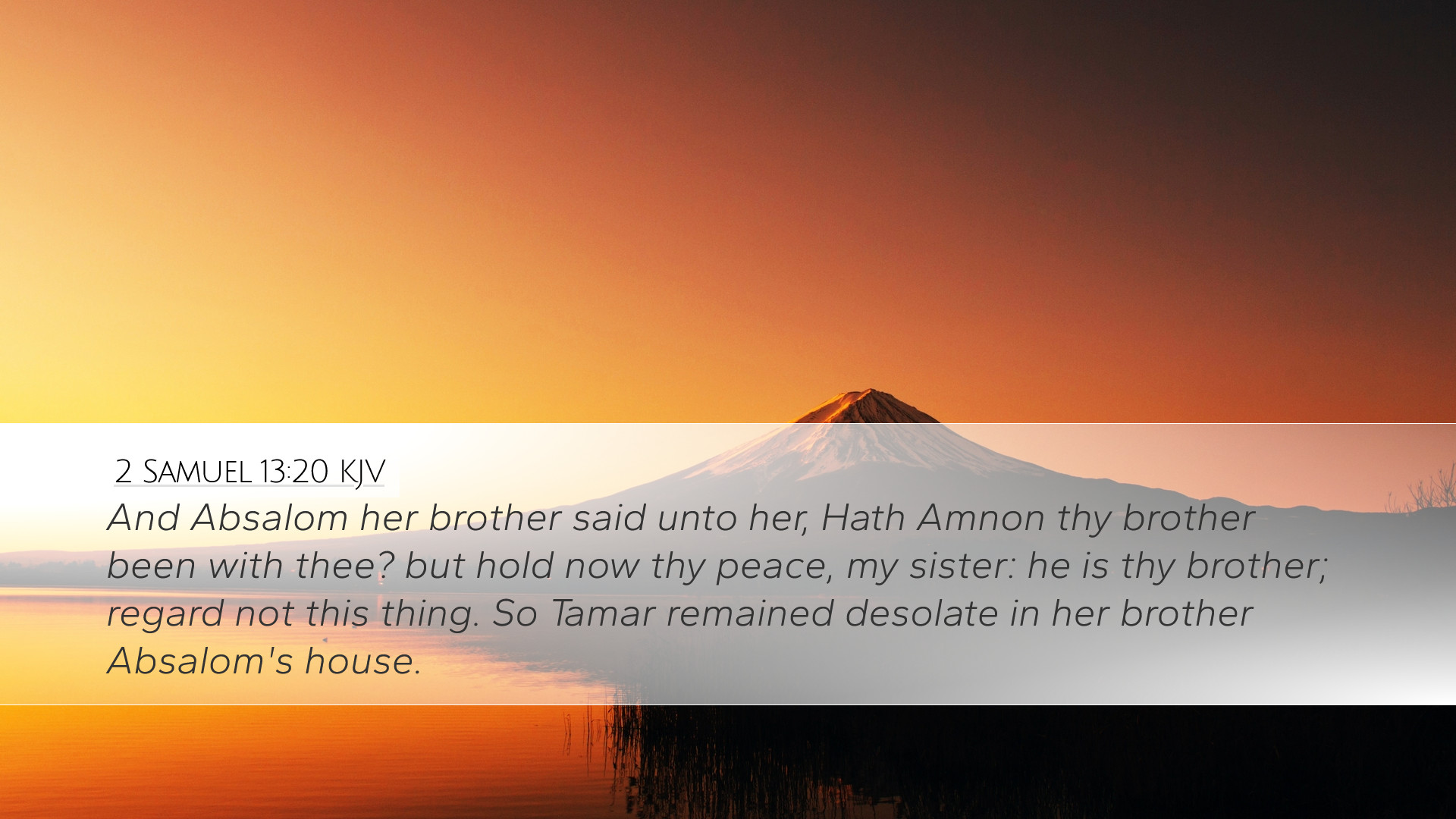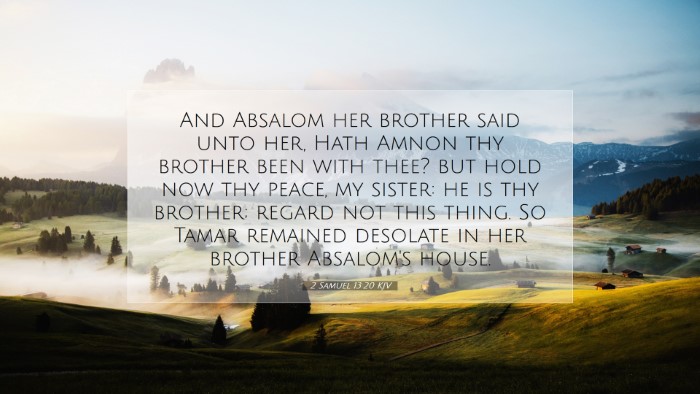Commentary on 2 Samuel 13:20
Verse: "And Absalom her brother said unto her, Hath Amnon thy brother been with thee? Hold now thy peace, my sister: he is thy brother; regard not this thing. So Tamar remained desolate in her brother Absalom's house."
This verse is a pivotal moment in the narrative surrounding Tamar, Amnon, and Absalom. It captures the aftermath of a grievous sin and the complexities of familial relationships. Below is a synthesis of insights from prominent public domain commentaries.
Contextual Background
Tamar was the daughter of King David and the sister of Absalom and Amnon. Amnon’s lustful actions towards Tamar lead to her desolation, placing this verse within the broader themes of sin, family loyalty, and the tragic consequences of actions within a royal household.
Insights from Commentaries
1. Matthew Henry's Commentary
Matthew Henry emphasizes the emotional turmoil that Tamar experiences after her assault. He points out that Absalom's response demonstrates a protective brother's instinct, which reflects both love and sorrow. He remarks that Absalom's advice for Tamar to keep silent may appear well-intended but ultimately leads her to loneliness and despair. According to Henry, this moment foreshadows the conflict that arises later due to Amnon's actions, highlighting that sin has lasting repercussions.
2. Albert Barnes' Notes on the Bible
Barnes adds a deeper exploration into the societal implications of Tamar's situation. He notes that the shame and disgrace associated with her violation not only affected her personally but also positioned her precariously within the royal family dynamics. Barnes points out that Absalom’s statement, “he is thy brother; regard not this thing,” lacks understanding of the emotional wounds that Tamar now bears. Barnes also stresses that despite her lineage, Tamar is left in a state of desolation, indicating the failings of male figures in her life, particularly reflecting on David’s inability to act as a just father.
3. Adam Clarke's Commentary
Adam Clarke provides a poignant analysis of the psychological impact on Tamar and highlights her tragic isolation. He notes that being “desolate” signifies not merely her physical state but her emotional and psychological devastation. Clarke interprets Absalom’s caution as an attempt to protect Tamar from further shame, albeit misguided. He addresses the moral complexities surrounding the actions of Amnon and the ensuing family dynamics that result in greater conflicts, bearing in mind that this is a precursor to Absalom’s eventual rebellion against their father, King David, which stems from unresolved familial grief and vengeance.
Theological Reflections
From this passage, several theological themes emerge:
- The Nature of Sin: The verse highlights the destructive effects of sin, particularly within a family context.
- Family Dynamics: It invites contemplation on the responsibilities of family members and the failure to protect the vulnerable.
- Desolation and Healing: The emotional desolation experienced by Tamar poses questions about recovery and healing in the aftermath of trauma.
- The Role of Justice: The apparent absence of justice for Tamar underscores a theological reflection on how God sees injustice and works within human history to bring about righteousness.
Application for Pastors and Theologians
This passage presents critical lessons and areas for pastoral care and reflection:
- Empathy and Support: Pastors are called to create spaces where victims of trauma like Tamar can find support and healing.
- Addressing Injustice: The church must advocate for those who have suffered injustices, reflecting God’s heart for the broken-hearted.
- Family Ethics: Encouraging healthy family dynamics and accountability within families, especially addressing male responsibility in protecting and uplifting women.
- Counseling and Support Ministries: Developing ministries that focus on healing from trauma, inspired by Tamar's narrative, demonstrating the importance of addressing emotional and psychological well-being.
Conclusion
The verse from 2 Samuel 13:20 serves as a profound reminder of the complexities of human relationships tainted by sin. The insights gleaned from these commentaries provide a multifaceted view of the emotional, social, and theological implications of Tamar's tragic story. For pastors, students, and scholars, it presents a call to engage deeper with the weight of sin and the need for compassion, justice, and healing in our communities.


